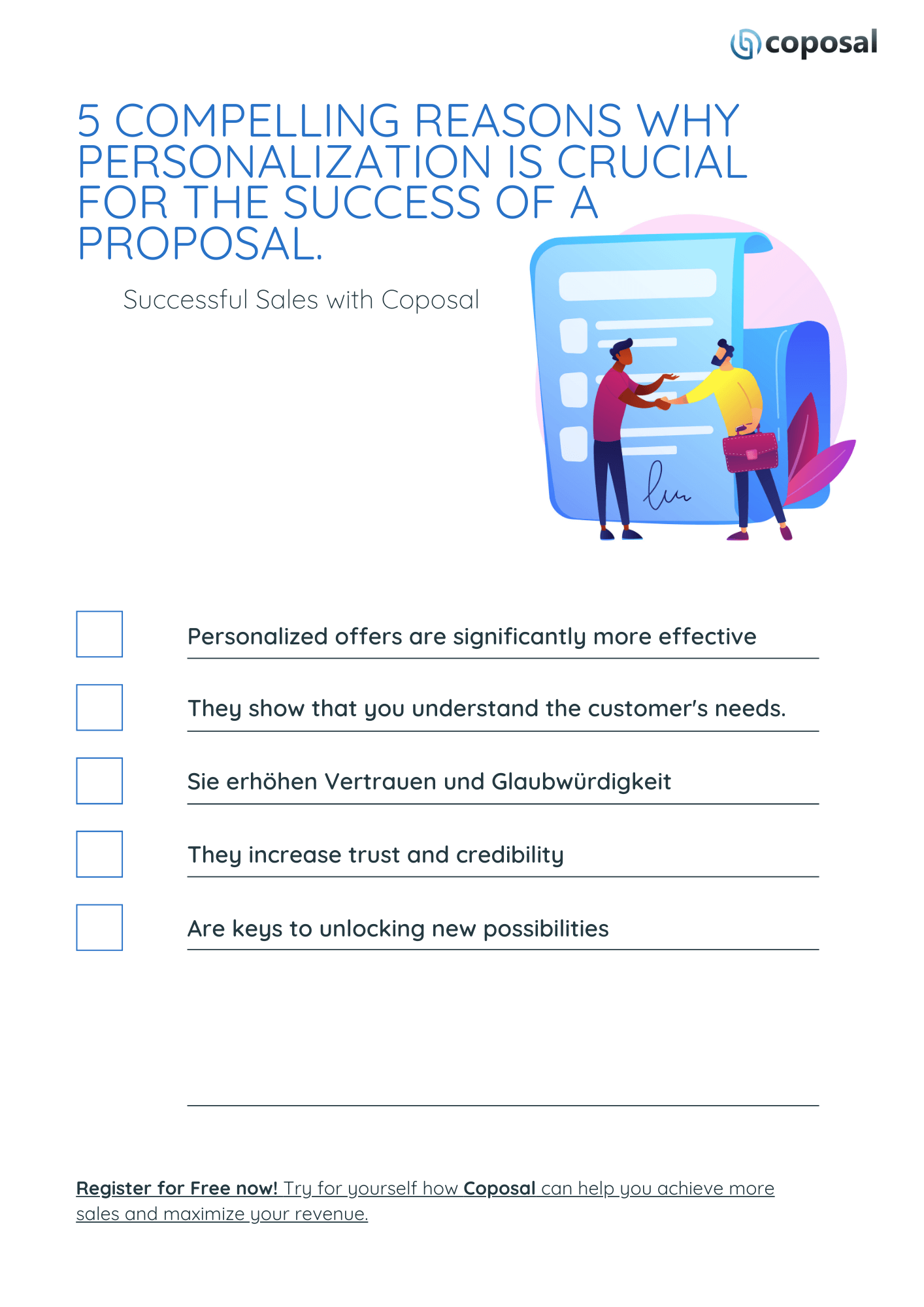 A convincing proposal has become crucial for success.
A convincing proposal has become crucial for success.
What sets a successful proposal apart from the rest is not only its content but also its level of personalization.
Personalization is not just about addressing the recipient by name; it's about customizing every aspect of the proposal to match the recipient's needs and interests.
In this article, we present 5 reasons why personalization is not just a "nice-to-have" but an absolute necessity for the success of every proposal.
Table of Contents
Definition of Personalization (of Proposals)
Personalization in the context of proposals refers to the practice of adapting the content, tone, and delivery of a proposal to the specific preferences and needs of the recipient.
It involves going beyond generic templates to create a customized experience that resonates with the individual on a personal level.
The Importance of Proposals in Business

Proposals serve as a gateway to new opportunities, whether it's closing a lucrative deal, winning a contract, or attracting investors.
They encapsulate a company's offerings, value proposition, and vision, making them essential tools to drive business growth and expansion.
The Importance of Personalization (of Proposals)
- Customized proposals for individual customers
Generic, one-size-fits-all proposals often fall flat because they don't address the individual pain points and requirements of the recipient.
By personalizing, you can demonstrate a deep understanding of the customer's needs and present solutions tailored specifically to those requirements. - Impact of personalized proposals on success
Studies have shown that personalized proposals are significantly more effective than their generic counterparts.
By showing that you have taken the time to understand the customer's challenges and goals, you build trust and credibility, increasing the likelihood of a positive response.

Personalization Techniques
- Data-driven personalization techniques
One of the most powerful tools of personalization is data. By leveraging customer data such as past interactions, preferences, and purchase history, you can create proposals that are highly relevant and targeted. - Utilizing customer preferences
Beyond data, understanding the customer's preferences, communication style, and decision-making process can inform how you structure and deliver your proposal. Whether it's a formal document, a presentation, or a video pitch: aligning with the customer's preferences increases receptivity.
Implementing Personalization
- Integrating personalization into proposals
Personalization should permeate every aspect of the proposal, from the opening statement to the closing remarks.
This includes customizing the content, addressing the recipient by name, and mentioning specific pain points and goals. - Adapting content and delivery
In addition to content, consider how the proposal is delivered. Whether it's an email, a personalized landing page, or a face-to-face meeting, the delivery channel should align with the recipient's preferences to maximize impact.
Examples of Successful Personalization
- Case studies on the success of personalized proposals
Numerous case studies demonstrate the impact of personalization on the success of proposals. From tailoring product offerings to addressing specific pain points, personalized proposals consistently outperform generic proposals in conversion rates and customer satisfaction. - Examples and results from practice
For example, companies saw a doubling of contract values by segmenting proposals based on customer demographics and behavior.

Challenges and Solutions
- Overcoming hurdles in personalization
While personalization offers significant benefits, it is not without challenges.
Common obstacles include limited access to customer data, resource constraints, and the risk of over-personalization.
With the right strategies and technologies, these challenges can be overcome. - Addressing common challenges in proposal writing
Furthermore, crafting proposals itself presents a range of challenges, from striking the right balance between personalization and professionalism to ensuring clarity and conciseness.
By using templates, automation tools, and feedback loops, companies can streamline the proposal creation process while maintaining a personalized touch.
Summary
In conclusion, personalization is not just a buzzword; it is a strategic necessity for the success of every proposal.
By adapting your proposals to resonate with each individual recipient, you demonstrate your commitment to their success and build deeper, more meaningful relationships. In an increasingly competitive market, personalization is not just an option; it is the key to unlocking new opportunities and driving business growth.
 Reading Tip: If our article has been helpful and you'd like to learn more tips for writing proposals, continue reading here: "Mandatory Information in Your Proposals - What Should Never Be Missing"
Reading Tip: If our article has been helpful and you'd like to learn more tips for writing proposals, continue reading here: "Mandatory Information in Your Proposals - What Should Never Be Missing"
Frequently Asked Questions About Personalizing Proposals
How does personalization impact proposal success?
Personalization increases the relevance and resonance of proposals, enhancing the likelihood of a positive response from the recipient.
What are some common challenges in implementing personalization?
Limited access to customer data, resource constraints, and the risk of over-personalization are common challenges in implementing personalization.
Can personalization be automated?
Yes, with the advent of AI and machine learning technologies, many aspects of personalization can be automated, allowing companies to efficiently scale their efforts.
What role does customer feedback play in personalization?
Customer feedback serves as a valuable source of insight for personalization, enabling companies to refine their strategies and offerings based on real-time input.
Are there ethical considerations in personalization?
Yes, companies must ensure that their personalization efforts are conducted ethically and transparently, respecting user privacy and consent at all times.
How can companies measure the effectiveness of personalization?
Key Performance Indicators (KPIs) such as conversion rates, engagement metrics, and customer satisfaction scores can be used to measure the effectiveness of personalization initiatives.